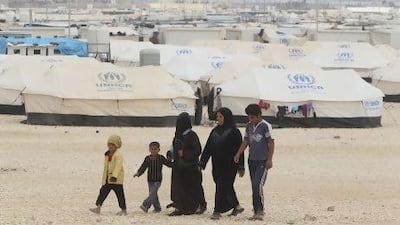ZAATARI, JORDAN // First, the scorching summer heat and dust storms made life unbearable for Syrians at the Zaatari refugee camp north of Amman. Now, as winter approaches and temperatures drop into the single digits at night, it is the cold that poses the latest threat to their health.
The United Nations and a variety of aid groups are rushing to assist an estimated 250,000 Syrian refugees in Jordan - including anywhere from 31,000 to 40,000 in Zaatari - but a funding shortfall could leave many more out in the cold.
Trucks carrying white, prefabricated buildings roar up the highway to Zaatari on a daily basis, their haul funded by Saudi Arabia. The basic structures are expected to provide a sturdy home for a third of the most vulnerable residents and those who have been there the longest.
These shelters include a door, floor, toilet and basic kitchen to replace the relatively flimsy tents in which they have been living since the camp opened in July, according to Andrew Harper, the representative of the United Nations' refugee agency, UNHCR, in Jordan.
The rest of the Syrian refugees in Zaatari will receive thermal blankets, heaters and enhancements to their tents - tarpaulins, insulation and materials for makeshift porches, Mr Harper said.
But donors have only pledged enough to cover the refugees already living in the camp, he said, even though each day an average of 500 Syrians cross their country's southern border into Jordan.
"The nights are very, very cold, and our coverings are not enough," said a 22 year-old man from the Syrian city of Deraa. He lives in a tent with his mother and four younger siblings.
But the situation is improving as as aid workers hand out supplies and have begun installing heaters.
"The weather has had a really big effect on me, but it's affected the children in particular," he said.
Thousands of Syrians crossed the border in the summer months.About 140,000 live in Jordan, according to UNHCR statistics releasedtoday, and the Jordanian government has said about 100,000 more undocumented refugees are spread throughout the country.
"The events in Syria are a huge burden for the kingdom which hosts more than 250,000 refugees," Abdullah Nsur, the country's prime minister, told the cabinet Monday, according to the official news agency Petra. The majority of Syrians in Jordan are scattered throughout the kingdom's northern cities, as well as in the eastern section of the capital Amman.
About 4,000 familiesliving outside the camp, considered the most at risk - including the elderly, children and sick - will receive monthly payments of 120 Jordanian dinars (Dh623), set to increase by 50 per cent by the end of the year and threefold by the end of March, Mr Harper said. Another 4,000 families will receive one-time payments to help them purchase blankets, mattresses and heating for their often squalid, poorly insulated apartments.
That leaves about 80 per cent of families outside the camp without financial assistance during the harshest winter months, Mr Harper said.
The UNHCR's Jordan operation predicament is the same across the region, where donors have met only 35 per cent of the US$487.9 million (Dh1.8bn) requested by UNHCR and its partners for the Syria crisis, the UN said last month.
The UNHCR expects the number of refugees by year's end to reach 700,000 as fighting in Syria intensifies.
Violence in Syria has killed more than 41,000 people since the start of an uprising against the regime of Bashar Al Assad in March 2011, according to the Syrian Observatory for Human Rights, a Britain-based watchdog. To relieve the pressure on Zaatari, a new camp will be ready before the end of the year in Jordan to receive more Syrian refugees, authorities said. The prefabricated buildings funded by Saudi Arabia are arriving at Zaatari at a rate of about 100 per day and about 2,500 should be in place by mid-December, he said. Another 650 structures were funded by private donors, the UAE and Oman.
"We're doing our best to provide assistance," Ayman Al Mufleh, the secretary general of the Jordan Hashemite Charity Organisation, which is coordinating relief for the Syrian refugees in Jordan, said. "We need help."
No one at the camp has died from the cold thus far, aid officials said, but people have almost certainly suffered from fevers or other sicknesses related to the weather.
At the camp's sole school, enrolment jumped last month after classes moved from 14 tents to several prefabricated buildings.
"Now, we have a warm place to go in the morning when it's cold," said Ghazal Yusef Al Shwamra, 11.
* With additional reporting by Agence France-Presse

